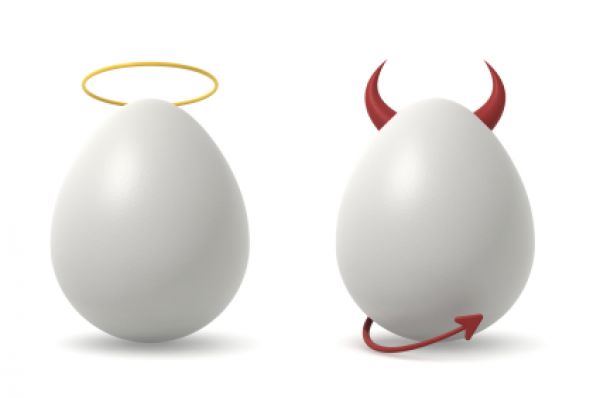Your Brand: Should You Dare to Compare?
I was recently watching a kid-friendly TV show with my family. One of those typical commercials came on comparing diaper brands in a side-by-side demonstration, using that curious blue liquid that is simultaneously poured out of two glass beakers. How much will each absorb…how quickly…? My daughter turned to me and said, “You know, I really hate those commercials.”
I asked her why figuring it was simply because it was about baby diapers. Even under the guise of an innocuous blue liquid, when you really think about it, it’s not the most pleasant of topics. Especially to a nine-year-old kid who would promptly file it under the “gross!” category.
“I really don’t like commercials like that because they are SO RUDE!” she declared. My curiosity led me to ask her what she meant by that. She responded, “I think it’s really mean when they compare their product to someone else’s. I don’t think they even ask for permission because why would the other diaper company say ‘yes’ to that?” Interesting observation, right?
COMPARING YOUR BRAND TO COMPETITION: HELPFUL OR HARMFUL?
Here was my nine-year-old daughter perceiving something that branding, marketing and communications professionals like myself are faced with every day. How much do you determine your own brand positioning and craft those careful messages by directly or even subtly comparing them to somebody else? When is that helpful and when is that counter-productive?
FIRST, KNOW THYSELF
Before you set out to compare yourself to another brand, first make sure your company or product has clearly defined its own brand strengths and attributes. You need to know who you are and what needs your brand fulfills for your audience. You also need to create messaging relevant to your audience to establish interest, make a lasting impression and ultimately earn their trust.
That is NOT to say that you should not thoroughly understand your competitors when defining your own brand. That competitive landscape is critical in shaping your own brand strategy and positioning, especially if you are in a crowded market.
Without comprehensive research on other brands playing in the same space, it is simply impossible to determine your core differentiators. An analysis of your competitors’ positioning and what angles they are vying for in the market – along with what attributes are important to your target audience – will help to identify any unoccupied “white space” that you can be your “claim to fame” in order to stand distinctively in the crowd.
PUTTING YOUR BRAND UP AGAINST A COMPETITOR
So when is it helpful to go this route? One typical scenario is when you are in a highly crowded, competitive market where it becomes difficult to be perceived as unique, especially when everyone is saying essentially the same thing. Communicating any extra edge your brand has might be more memorable if it is expressed in direct comparison to another brand. Take the value-priced Suave shampoo brand. Although it has shifted its strategy during recent years, for decades it directly compared its brand to other, higher-priced shampoo products, claiming the same performance but at a lower cost.
Another reason is when you rank low for brand awareness. Your brand or product can ride on the coattails of a more established, recognized brand if you can make a confident claim why yours delivers the better choice over the competition.
TO-DO’S TO COMPARE YOUR BRAND
Going head-to-head bears some risk which can be mitigated with the right approach:
-
- Include data to back up your comparative assessment and be sure it’s objective. Your claim must be believable – not just because YOU say so.
- Be careful about the tone you take. Be clear, to the point and positive. You need to be perceived as helpful and informative, not as a nay-saying jerk. Such negativity will reflect more poorly on your brand image than on your competitor’s.
- Regardless of how you compare your brand to another, make sure you can stand on your own two feet. Your brand must be meaningful to your audience on its own. Things change, so relying only on a comparative stance is not a good long-term plan.
BRAND DIFFERENTIATION VS. COMPARISONS
Whether you decide to compare your brand or not, achieving differentiation is the goal to strive for. That is not exactly the same as a comparison between brands. A comparison is, well, just that: comparing one brand (or product) directly to another on any number of levels.
On the other hand, differentiation means you have something unique that is giving your brand an edge. Maybe a constructive comparison can help you get there. But true brand differentiation means that you are recognized for a special quality or you can make a meaningful claim that no other brand can. That is far stronger than how you compare in any side-by-side, blue-liquid test. That is brand gold.
Share an example of where you have seen a successful or harmful brand comparison strategy in the comments below.




Leave a comment:
You must be logged in to post a comment.